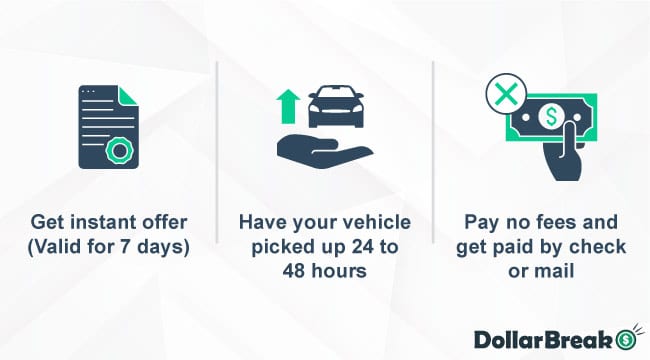Quick Answer:
When selling a damaged car, the most crucial step is to fully disclose all damages and issues to the buyer.
Completing a bill of sale that specifies the car is sold “as is” offers protection from potential legal challenges from the buyer.
Nevertheless, the optimal approach for selling a damaged car is often through online companies like Peddle, Wheelzy, and CarBrain. These platforms can expedite the selling process to within 48 hours, and they offer free towing of your vehicle.
Key Takeaways:
- Disclose All Damages: Fully disclose the condition and damages of the car to potential buyers to avoid legal complications.
- Utilize Online Platforms: Use online companies like Peddle, Wheelzy, and CarBrain for a quick and efficient selling process, often including free towing.
- Set Realistic Prices: Determine the car’s value using car valuation websites and online marketplaces, considering repair costs and overall condition.
- Complete Necessary Paperwork: Ensure all legal documents, including the Certificate of Title and a bill of sale, are prepared and processed correctly.
Best for Older & Damaged Cars

Buys used, damaged or junk cars
Free tow and no hidden fees
Pays by ACH trasfer or check
Top Pick for Junk Cars

Free, no-obligation cash offers
Offers free paperwork service
Pays on the spot upon pick up
Can You Sell a Damaged Car?
You can sell a damaged car legally in all states, but there are specific requirements and considerations that sellers need to be aware of.
- Disclosure of Status: the damage to the vehicle must be disclosed to the buyer.
- Type of Title: if the car has a Salvage or Rebuilt Title, this information must be disclosed to the buyer.
Selling a damaged car without disclosing the damage can expose you to legal action from the buyer. If a buyer discovers post-purchase that the car has been in an accident, you could face legal charges.
How Much Damage Affects the Value of the Car?
The value of a car can be significantly affected by damage, with the extent of the impact depending on various factors, such as the severity of the damage and the car’s initial condition:
- Severity of Damage: minor cosmetic damage, such as scratches or dents, may only reduce the value by a few hundred dollars. However, major structural damage, such as a bent frame or totaled engine, can significantly reduce the value or even render the car worthless.
- Type of Damage: cosmetic damage is generally less impactful than mechanical or structural damage. This is because cosmetic damage can often be repaired relatively easily and does not affect the car’s safety or performance.
- Overall Condition of the Car: a well-maintained car with low mileage will typically be worth more than a car with high mileage and poor maintenance records.
Providing an exact estimate of how damage affects a car’s value is challenging without specific details about the damage.
However, the value of a car can decrease by varying percentages depending on the damage’s severity:
- Minor cosmetic damage: 5-10%
- Moderate cosmetic damage: 10-20%
- Major cosmetic damage: 20-30%
- Minor mechanical or structural damage: 20-40%
- Moderate mechanical or structural damage: 40-60%
- Major mechanical or structural damage: 60-80%
- Total loss: 90-100%

Can You Trade in a Damaged Car?
Yes, it’s possible to trade in a damaged car. However, the trade-in value you’ll receive varies based on the extent of the damage.
For minor damage, the trade-in value could still be reasonable. But if the damage is substantial, you might only get an amount equivalent to the car’s scrap value.
Should You Repair the Damaged Car Before Selling It?
Here are some factors to consider when deciding whether or not to repair a damaged car before selling it:
Cost of repairs: If the cost of repairs is more than the car is worth, it is not worth repairing it. In this case, you may be better off selling the car online.
Potential resale value: If the car is a popular model or has a high resale value, it may be worth repairing the damage to increase its resale value.
Your time and effort: Repairing a car can be time-consuming and frustrating. If you do not have the time or patience to deal with repairs, you may be better off selling the car as-is.
Knowledge: If your expertise in car repairs is limited, attempting to fix a damaged car might not be worthwhile. You could end up either selling it as-is for a lower price or incurring additional costs by hiring a mechanic.
How to Sell a Damaged Car?
1. Find the Estimated Cost of Repairs
The cost of repairs can range significantly, from minor expenses (like a paint pen for less than $20) to major repairs (such as replacing a complete roof or hood, which can run into thousands of dollars).
Take the vehicle to a few local car repair shops for detailed inspection. Compare the value of the estimated repair costs, including prices of replacement parts.
Knowing the estimated cost of repairing a damaged car can be extremely beneficial when selling it privately.
Benefits of knowing the estimated repair price:
- Set a realistic selling price: setting a price that accurately reflects the car’s condition and potential repair expenses will attract buyers who are aware of the damage and prepared for the associated costs.
- Leverage in negotiations: you’ll be able to explain the damage, provide cost estimates, and justify your asking price.
- Demonstrate transparency: providing potential buyers with repair estimates demonstrates your transparency and honesty, building trust with potential buyers and encouraging them to consider your car seriously.
- Save Time and Effort: you can avoid wasting time with buyers who are not prepared to deal with the damage and its associated expenses.
- Protect Yourself from Legal Issues: buyers are less likely to make claims against you if they are aware of the damage and its estimated costs.
2. Set the Price
Three recommended methods to assess your car’s value include using car valuation websites, examining prices on online marketplaces, and obtaining quotes from online car-buying companies specializing in buying damaged cars.
- Car Valuation websites: Kelley Blue Book, Edmunds, J.D. Power
- Online marketplaces: CarGurus, Autotrader
- Online car-buying companies: Peddle, Wheelzy, CarBrain
The value of your car is affected by various factors such as its make and model, trim level, mileage, age, overall condition, market demand, the presence of a warranty, service history, and the method of sale.
3. Get a Vehicle History Report
A vehicle history report can provide you with valuable information about the car’s history, including any accidents or repairs it has been in.
Benefits of providing vehicle history report:
- Helps disclose any damage to potential buyers
- Reduces risk of legal liability
- Helps find seriously interested buyers
- Can help set a fair price
- It can give you leverage in negotiations
Best places to get a vehicle history report:
4. Decide Between Selling Online or Privately
On average, selling a car privately takes about 52 days. Selling a damaged car online, on the other hand, can take less than 48 hours.
Selling Damaged Car Privately:
When you sell a car to a private car the process includes preparing the car and its documents, pricing it appropriately, advertising on online marketplaces, engaging in negotiations with potential buyers, and handling the title transfer.
The best platforms to sell:
Selling Damaged Car Online:
Selling a damaged car online is a notably simpler and faster process. To get started, you have to request a cash offer by filling out the online form.
You will be asked to provide:
- Car’s make, model and trim
- Type of title (clean, salvage or rebuilt)
- Mileage
- Your zip code
- Describe condition
After filling out the online form you will get an instant cash offer which is typically valid for 7 days.
Advantages of selling a damaged car online:
- Quick process: you will spend no more than a few minutes to get an offer
- Quick turnaround: usually, it is no more than 24 hours from accepting the offer to getting paid
- Safe to sell: selling a damaged car online to an accredited company is safer than selling it privately
- Safe payment methods: you will get paid by check or cash at the time of the car’s pickup
- No fees: selling a damaged car online is totally free
- Free car pickup: the company will pick up your damaged car (running or not) from your specified location
- No paperwork hassle: The company’s representative will take care of all the paperwork. You only need to provide a car.
The best online companies to sell your damaged car:
Peddle
Peddle is one of the largest car-buying companies that buy damaged cars across the United States.
Peddle buys damaged cars in all conditions, including:
- Cars with water damage
- Non-running cars
- Accident-damaged cars
- Cars with missing parts
- High mileage cars
- Salvage or junk cars
Wheelzy
Wheelzy is another company that buys a wide range of used and damaged cars. However, the company has some exceptions:
- Can only sell cars 1981 or newer
- No motorcycles or other two-wheeled vehicles
- No ATVs, campers or RVs
CarBrain

CarBrain offers a fast way to get a cash offer. Filling out an online form will only take a few minutes and offers safe payment by cash.
CarBrain buys cars in over 7 conditions:
- Broken
- Parted cars
- Non-running cars
- Junk, salvage or scrap
- Car with mechanical problems
- Cars with falling objects
- and more
5. Prepare Paperwork
The list of required paperwork to sell a car varies by state in the U.S. However, a Certificate of Title is a common requirement nationwide.
Depending on your state, additional documents such as a signed and notarized bill of sale, a VIN inspection, and a current emissions test report might be necessary.
To establish the value of your vehicle and reassure prospective buyers of its upkeep, consider performing a VIN check, gathering all maintenance records, and including the owner’s manual in your set of documents.
If you decide to sell car online to Peddle, Wheelzy, and CarBrain you only need to provide Certificate of Title
6. Sign the Bill of Sale
Even if your state doesn’t legally require it it’s advisable to complete a bill of sale when selling your damaged car.
Key reasons to sign a bill when selling a damaged car:
- Liability protection: without a bill of sale, you could be held accountable for any incidents or issues the buyer encounters with the vehicle.
- Legal issues: state that you sell the car “as is” in the bill of sale to avoid any legal issues after completing the sale
- Proof of transaction: a bill of sale is a binding legal document that confirms the sale of the vehicle to the buyer.
- Record keeping: it provides a detailed record of the sale, including the sale date, sale price, and both parties’ contact information. This is useful for tax purposes or for verifying the sale.
7. Transfer Title & Notify DMV
When selling your car privately, transferring the ownership is a crucial step in the entire process. This includes signing the Title, notarizing it if required by state law, including the odometer reading and submitting it to the DMV.
It’s important to inform the DMV promptly after selling your damaged car, typically within 5 to 15 days following the title transfer. Depending on your state, this notification can be made online or by mailing a paper form.
8. Cancel Insurance
After completing the sale of your car, it’s vital to take care of an important administrative step: canceling your car insurance.
You should quickly reach out to your insurance provider to terminate your policy. Paying for insurance on a car you no longer own is redundant and can lead to unnecessary expenses.
Furthermore, you might qualify for a reimbursement of any advance premiums you’ve paid.





